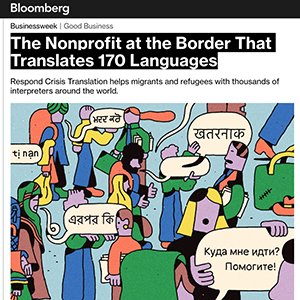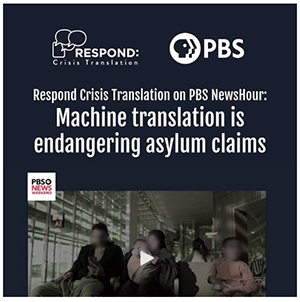Respond covered in Bloomberg, Reuters, PBS, Al Jazeera, Teen Vogue: Raising awareness about language rights in 2023
While working tirelessly around the clock to provide life-saving translation and interpretation on the front lines of crises across the globe, Respond has also driven coverage on issues of language justice throughout 2023.
Respond has spotlighted the dire language access issues at the southern U.S. border with Mexico.
A recent Bloomberg magazine feature described how Respond has become a primary lifeline for many migrants and advocates at the U.S.-Mexico border, especially for speakers of less commonly spoken and marginalized languages.
Respond’s Valentina Callari Lewis, in an op-ed in Teen Vogue, brought attention to the fact that asylum seekers who speak Indigenous and marginalized languages are regularly deprived of their fundamental human right to quality translation services at the US border.
We’ve forced western media to reckon with language gaps in coverage of the genocide in Gaza.
Our intervention into an egregious mistranslation of Arabic testimony by a Palestinian prisoner by BBC News was picked up by several outlets internationally. Among them was Al Jazeera English, which featured Respond Arabic Team Lead Ayah Najadat in a video about how language is being weaponized to demonize Palestinians.
Respond has also been instrumental in sounding the alarm regarding the serious dangers posed by the rising use of AI and machine translation in the U.S. asylum system.
On PBS NewsHour, Respond raised the alarm over how the government’s unsupervised reliance on machine translation costs translators their jobs and jeopardizes Afghans’ asylum cases. Several of our translators intervening in such language violence went viral.
“It’s almost impossible for a machine to convey the same message that a professional interpreter with awareness about the country of origin can do, including cultural context,” Respond’s Afghan Languages Team Lead Uma Mirkhail told The Guardian.
In Reuters’ Context, we spoke about how the everyday failings of AI-driven translation tools, such as names translated as months of the year, incorrect time frames, and mixed-up pronouns are causing havoc in the U.S. asylum system, with our human translators left to clean up the mess.
Respond exposed language violence by the U.S. government in RestofWorld, describing how asylum seekers are now required to use the government’s new glitchy CBP One Mobile App in order to initiate the asylum process – which is only partially accessible in 5 poorly-translated languages.
This is just a sampling of the news coverage featuring Respond voices this year; read more in “Latest News.”
This public education work – which continues to grow in caseload and importance every day – is only possible due to the diligent and rigorous work of our translators and interpreters, who are on the frontlines every day, are often crisis-impacted themselves, and know these stories best. They must be empowered and paid in order to continue doing the critical work of raising awareness about language access and language justice.





